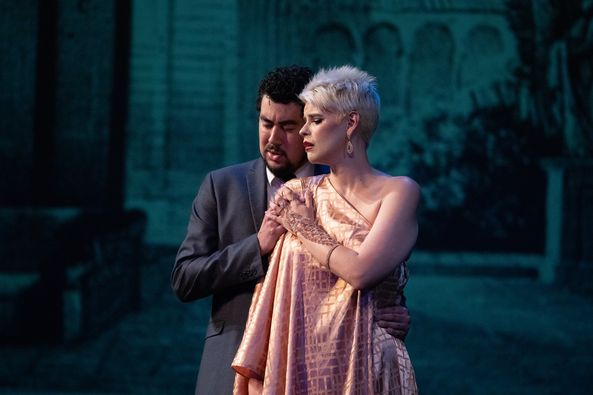Ricardo José Rivera and Chelsea Lehnea
(photo by Steve Pisano)
We cannot name a better educator in the field of opera than Will Crutchfield, General and Artistic Director of Teatro Nuovo. For many years we traveled up to Caramoor to enjoy his yearly entries into their summer music festival and lately we have come to enjoy his productions right here in New York City at The Rose Theater. His passion for Bel Canto opera fuels our own and his pre-opera lectures always contribute to our appreciation of the work to come. His expertise on Donizetti's advancements in the field of opera opened our ears to new listening discoveries.
We will report on tomorrow's production as well but we are too excited about last night's performance of Donizetti's Poliuto to hold our opinions inside. Performed without benefit of costumes and sets, the production went way beyond "concert style". We were not overwhelmed with meaningless and distracting projections; rather we saw each act accompanied by an upstage drawing of the respective settings , surmounted by translation of the libretto. The artists acted with conviction and the story was well told.
In an avalanche of casting glories we thrilled to the unique vocal timbre of soprano Chelsea Lehnea whose voice impressed us greatly at the Premiere Opera Competition earlier this year. She not only captured the emotional conflict of Paolina, a woman loyal to Poliuto (the man she wed after the reported demise of Severo, the man she truly loved), but also the pain of rejecting the latter after he finally reappears, alive and well. Her stunning technique was put into service to make dramatic points. Who could fail to notice the upward leaps followed by descending portamenti! Also well captured was the spiritual uplift of her decision to join Poliuto in Christian martyrdom.
As the eponymous hero, we heard tenorrific Argentinian Santiago Ballerini whose beautiful and unforced tenor added at least a foot to his physical stature. There is a special thrill to the tenor fach which can be destroyed in an instant by a tight throat in the upper register. Mr. Ballerini suffers no such impediment and allows the listener to bask in his warm tone, even when singing at the top of the register at maximum volume. (We are congratulating ourself for predicting his success when we reviewed him 6 years ago.)
The role of the long lost lover Severo was effectively performed by Puerto Rican baritone Ricardo José Rivera with the artistry to match that of Ms.Lehnea and Mr. Ballerini. He was so persuasive in his Act II courting of Paulina we could only think of how difficult it must have been for her to hold him off. As in many operas of the 19th c., romance is often foregone out of a sense of duty.
In this case, the story came from a 17th c. play by Pierre Corneille based on the martyrdom of St. Polyeuktos in the early Christian Era, adapted into a libretto by Salvatore Cammarano with input from the intended star. Sadly he never got to sing the role since problems with censorship delayed the premiere until 1848, by which time Donizetti had tragically died and the famous tenor had equally tragically jumped to his death. Now there's a plot for an opera!!!!
The censorship was caused by the Neapolitan censor's unwillingness to depict a Christian martyr as a jealous husband. Actually, the Christian conversion theme is the framework on which this romantic triangle plays out. Poliuto converts and,in solidarity, so does Paulina and both get thrown to the lions, a scene which the audience is fortunately spared. However it does give Poliuto and Paulina an opportunity to color their voices differentially.
The role of Nearco, the one who leads Poliuto to his conversion, was well sung by Robert Kleinertz, and we heard Krishna Roman in the role of Felice, Paulina's father. Jupiter's High Priest Callistene was portrayed by the imposing bass Hans Tashjian who successfully portrayed the vengeful rage of one whose religion has been scorned in favor of another one. With the full orchestra, his tone was often lost and when the orchestra was silent he sounded somewhat gravelly.
Speaking of the orchestra, we appreciated the many changes instituted by Teatro Nuova to respect the performing traditions of the period. Musicians were seated at audience level and instrumentalists were rearranged according to early 19th c. performing tradition. Most noticeably was the Concert Master--Jakob Lehmann-- leading the orchestra in place of a conductor on a podium. We thought he did a splendid job and we enjoyed the separation of the double basses for a delightful. effect in which they often served as percussion might have. The softer sound of gut strings and wooden wind instruments pleased the ear. We particularly enjoyed the woodwinds.
Special kudos to the members of the chorus who at various times portrayed Roman warriors and Armenian citizens willing to be cajoled into bloodthirsty cries for sacrifice.
We invite (urge) you Dear Reader, to enter "Poliuto" in the search bar if you would care to read about a production by Amore Opera from seven years ago which we reviewed. We never thought we'd have a chance to hear those gorgeous melodies again and we are grateful to Teatro Nuovo for giving us the opportunity.
Their mission is a unique one--continual ongoing discovery and implementation of historically valid elements of Italian opera of the Bel Canto period.
Look for another review tomorrow!
© meche kroop













